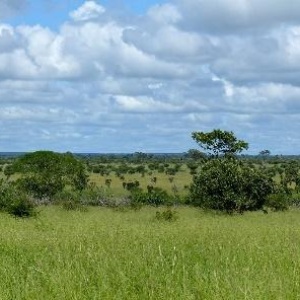
In parts of the world such as sub-Saharan Africa, significant agricultural expansion into natural ecosystems is predictable and likely unavoidable. This study presents a newly developed modelling tool, designed to provide quantitative answers to problem of how agricultural expansion could be located in ways that meet agricultural production goals, but which incur substantially lower losses of carbon and biodiversity than conventional agricultural development pathways.
Using Zambia as a case study, the tool allows users to weigh their preferences for factors affecting agricultural production and the environment, such as yields, transport costs, carbon emissions, and biodiversity loss, before calculating the resulting costs. The results show that for only small compromises in yield optimisation, large reductions in environmental costs are possible (as demonstrated in the graph below). The authors conclude that if put into practice, such decision support tools could substantially reduce the environmental costs of cropland expansion in sub-Saharan Africa’s savannahs.

Abstract
Rapidly rising populations and likely increases in incomes in sub-Saharan Africa make tens of millions of hectares of cropland expansion nearly inevitable, even with large increases in crop yields. Much of that expansion is likely to occur in higher rainfall savannas, with substantial costs to biodiversity and carbon storage. Zambia presents an acute example of this challenge, with an expected tripling of population by 2050, good potential to expand maize and soya bean production, and large areas of relatively undisturbed miombo woodland and associated habitat types of high biodiversity value. Here, we present a new model designed to explore the potential for targeting agricultural expansion in ways that achieve quantitatively optimal trade-offs between competing economic and environmental objectives: total converted land area (the reciprocal of potential yield); carbon loss, biodiversity loss and transportation costs. To allow different interests to find potential compromises, users can apply varying weights to examine the effects of their subjective preferences on the spatial allocation of new cropland and its costs. We find that small compromises from the objective to convert the highest yielding areas permit large savings in transportation costs, and the carbon and biodiversity impacts resulting from savannah conversion. For example, transferring just 30% of weight from a yield-maximizing objective equally between carbon and biodiversity protection objectives would increase total cropland area by just 2.7%, but result in avoided costs of 27–47% for carbon, biodiversity and transportation. Compromise solutions tend to focus agricultural expansion along existing transportation corridors and in already disturbed areas. Used appropriately, this type of model could help countries find agricultural expansion alternatives and related infrastructure and land use policies that help achieve production targets while helping to conserve Africa’s rapidly transforming savannahs.
Citation
Estes, L.D., Searchinger, T., Spiegel, M., Tian, D., Sichinga, S., Mwale, M., Kehoe, L., Kuemmerle, T., Berven, A., Chaney, N. and Sheffield, J. (2016). Reconciling agriculture, carbon and biodiversity in a savannah transformation frontier. Phil. Trans. R. Soc. B, 371(1703), p.20150316. doi:10.1016/j.gfs.2016.07.001
Read the full paper here (open access)
You can read related research by browsing the following categories of our research library: Primary production: agriculture; Agricultural and aquatic systems; Climate change mitigation; Land; Decision-making tools; Development/poverty; Biodiversity and ecosystems; Governance and policy; Africa.







Post a new comment »